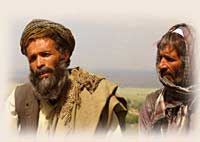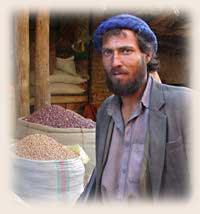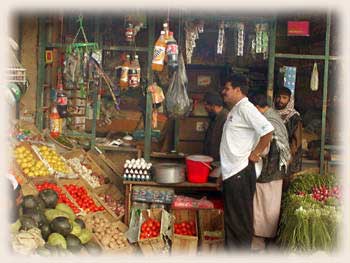| Main
Page
|
 Healthy
Soil Healthy
Soil
Healthy Crops
Healthy People
an Ecology Action Initiative in Afghanistan
Afghan Organic Agriculture
Training Center Project 10-Year Strategy
How
You Can Help
In collaboration with:
The Afghan Center
The Foundation for Global Community
The Afghan Retraining Initiative for Self-Employment (ARISE)
Why GROW BIOINTENSIVE®?
This method, now called GROW BIOINTENSIVE, is appropriate for the
situation in Afghanistan because it:
- Brings food security to areas that are lacking
in nearly all basic needs, including water and sewage systems,
roads, and electricity,
- Generally uses only locally available resources,
- Avoids use of chemical fertilizers and pesticides,
which can be difficult and expensive to obtain,
- Makes optimal use of limited water and seed
supplies— critical for Afghanistan, which has experienced
a drought for the previous four years and has a semi-arid to arid
climate in the best of times,
- Provides the farmer with a significant legal
income while also producing nourishing food for families,
- Relies on no machinery, thereby being accessible
to anyone with basic hand tools,
- Has proven capable of producing the highest
yields per unit area compared with other systems, and
- Builds a healthy, fertile soil while achieving
all of this!
 Ecology
Action is the premier research and training organization for the
high-yielding, resource-conserving, small-scale GROW BIOINTENSIVE
food-raising method. Ecology
Action is the premier research and training organization for the
high-yielding, resource-conserving, small-scale GROW BIOINTENSIVE
food-raising method.
Together with the Foundation for Global Community,
the Afghan Center, and the Afghan Retraining Initiative for Self-Employment
(ARISE), Ecology Action is bringing the GROW BIOINTENSIVE method
of sustainable farming to Afghanistan!
After 32 years of research, Ecology Action has
developed a method of mini-farming appropriate to the family-scale
farmer.
The GROW BIOINTENSIVE® method is being successfully
used for economic and nutrition intervention in 130 countries around
the world, including:
- Kenya where over 50 non-governmental organizations
are using GROW BIOINTENSIVE
- Mexico where an estimated 2 million people
are using GROW BIOINTENSIVE
- Ecuador, Uzbekistan, Russia, Argentina,
and The Philippines
Our Gardener On The Ground
Devon Pattillo has been practicing GROW BIOINTENSIVE techniques
for three years. He received his Bachelor's degree in Biology from
Reed College in 2000. He is passionate, motivated, and creative.
Devon is learning Dari, the local dialect of Farsi, and should prove
to be effective in bringing sustainable mini-farming to Afghanistan.
For more information about the ARISE project in
Afghanistan, please visit www.ariseproject.org
Afghan Organic Agriculture Training Center Project
10-Year Strategy
How
You Can Help

Afghan Organic Agriculture Training
Center Project
10-Year Strategy
The goal of the Afghan
Organic Agriculture Training Center (AOATC) is to empower people
to utilize organic agricultural practices for improved food security,
quality of life, and environmental restoration.
In order to achieve this goal, AOATC will:
- Encourage the re-establishment of basic agricultural
livelihoods using sustainable agricultural practices.
- Increase agricultural self-reliance to reduce
dependency on food relief and other types of agricultural aid
(donations of pesticides or fertilizers), especially among vulnerable
groups such as women.
Phase One Activities: October 1, 2004
to April 1, 2006 (18 months)
- Establish a 2500 square foot demonstration
farm in Kabul. The site will demonstrate how soil fertility can
be recovered to produce high yields and a balanced diet on the
smallest possible area without chemical fertilizers or pesticides.
- Identify farmer-teachers from six urban communities
in Kabul City and 14 rural communities in provinces surrounding
Kabul to partake in training courses. Trainers will in turn offer
courses to farmers within their own communities and farmer cooperatives
with support from the Kabul staff. Special effort will be taken
to include female participants.
- Establish collaborative partnerships with local
and international non-governmental organizations (NGOs), as well
as governmental and private sector groups.
Phase Two Activities: April 1, 2006 to
April 1, 2007 (12 months)
- Provide teacher-training courses for 42 additional
farmers and agricultural students from four universities.
- Provide technical support for all trainers
in their long-term local projects.
- Establish a rural demonstration site in one
village starting in spring 2006.
- Train two agricultural experts from western
Afghanistan to begin a demonstration site in Herat Province.
- Evaluate soil improvement strategies at urban
and rural demonstration farms. Research best practices for building
soil organic matter levels to 4% or more.
Phase Three Activities: April 1, 2007
to April 1, 2010 (36 months)
- Extend project to the six other major climactic/cultural zones
of Afghanistan.
- Follow results of individuals and cooperatives that apply the
method and incorporate successful techniques at the demonstration
center.
Phase Four Activities: April 1, 2010 to
April 1, 2015 (60 months)
- Identify partners in Tajikistan, Uzbekistan, Iran, and Pakistan.
- Continue to support community projects established in Phases
Two and Three.
- Host a conference on organic agriculture in South Asia.
top
How You Can Help |








 Ecology
Action is the premier research and training organization for the
high-yielding, resource-conserving, small-scale GROW BIOINTENSIVE
food-raising method.
Ecology
Action is the premier research and training organization for the
high-yielding, resource-conserving, small-scale GROW BIOINTENSIVE
food-raising method.